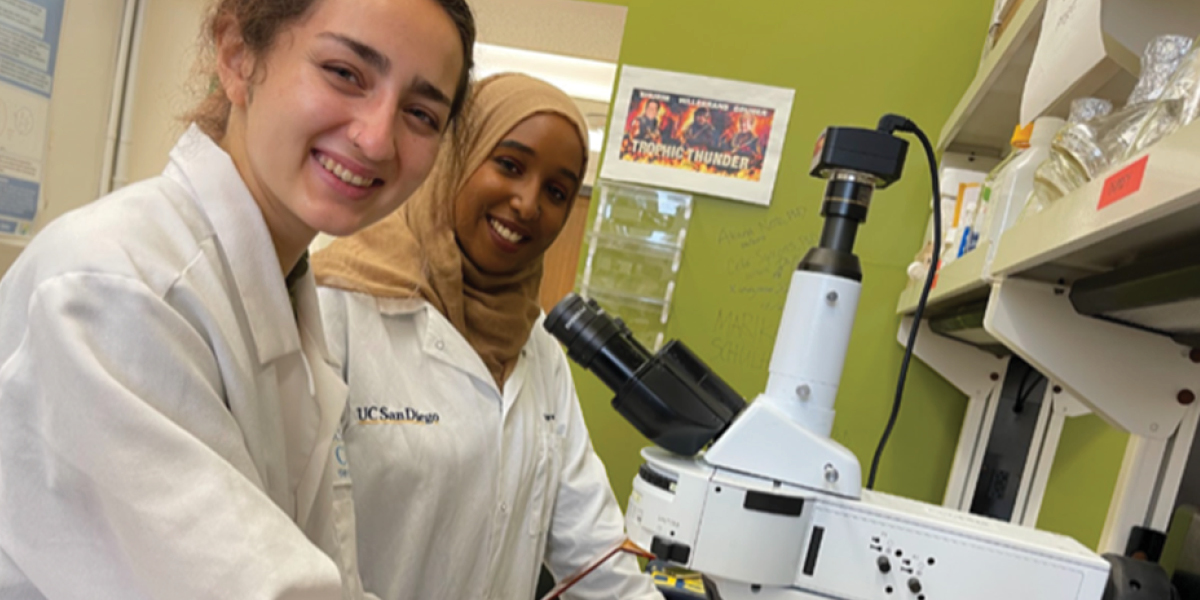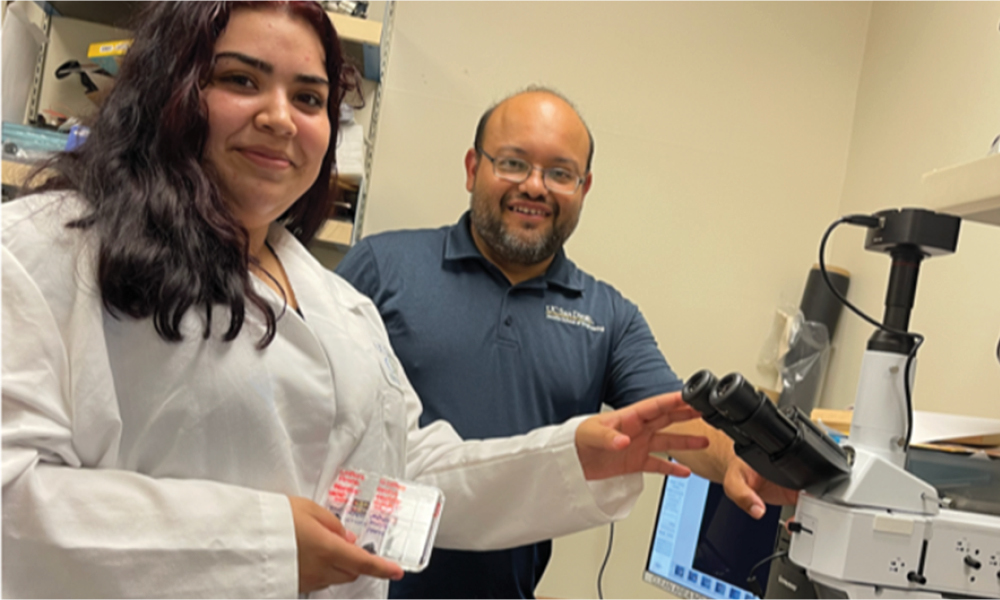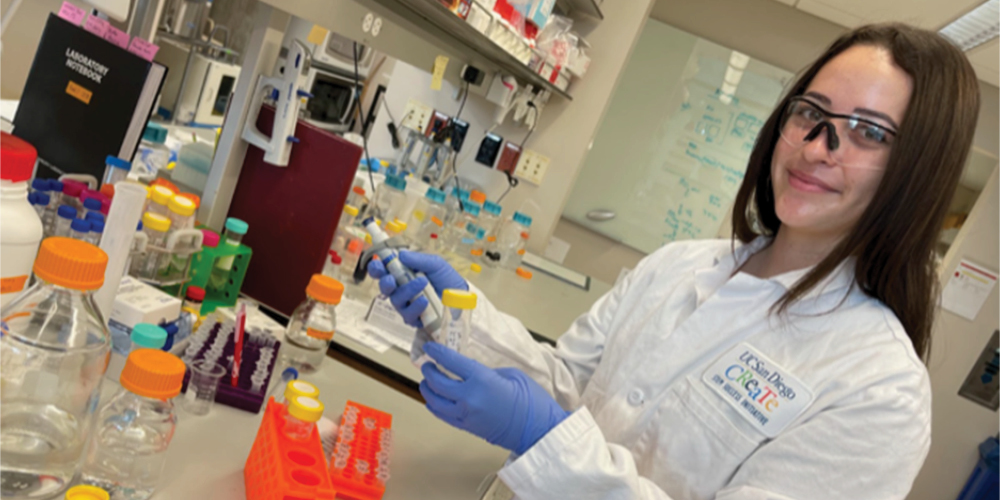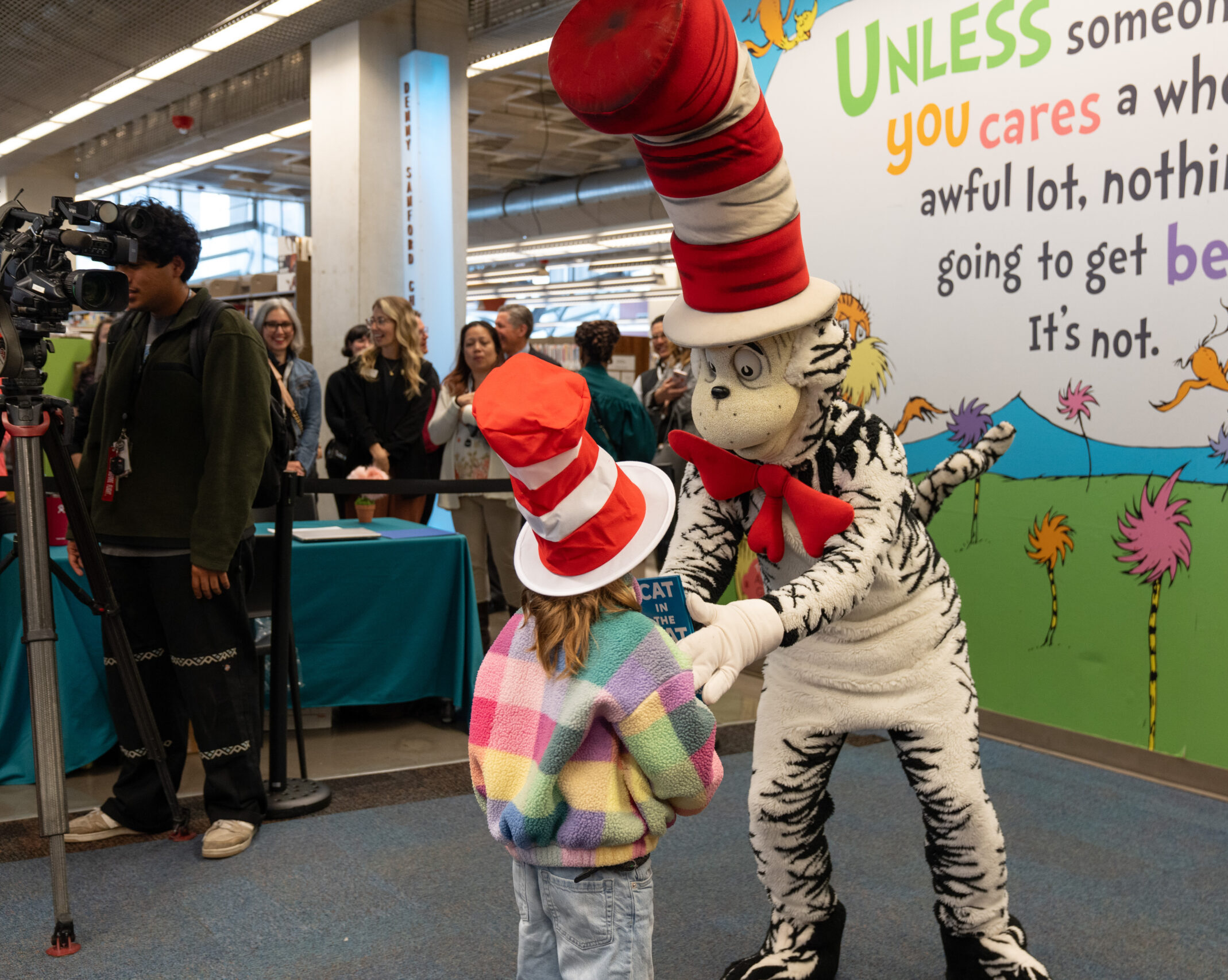Last summer, University of California San Diego’s Center for Research on Educational Equity, Assessment and Teaching Excellence (CREATE) hosted five students for a research experience for undergraduates customized to meet the unique needs of community college students.
Initially conceptualized as a one-year pilot in 2021, the STEM Undergraduate Learning and Teaching Empowerment (STEMULATE) program was created in partnership with San Diego Foundation and CREATE’s Dr. Beto Vasquez. Thanks to an extension from the San Diego Foundation’s Science & Technology Grant in 2021, unspent funds made it possible to host a smaller cohort this year and provide a similar experience to that of the 2021 STEMULATE cohort.
Additional funding provided by the U.S. Department of Defense Science, Technology, Engineering and Mathematics (DoDSTEM) program and the Rohr Endowment furthered CREATE’s ability to support additional scholars this past summer and provide a unique experience.
Hands-on Research and Mentorship
Much like the first cohort of STEMULATE students, this past year’s participants spent eight weeks performing hands-on research as visiting scholars in laboratories on the UCSD campus with mentorship from faculty researchers.
The program allows student researchers to reinforce their identities in STEM by giving back through community service and volunteer opportunities in the spring semester and by spending the summer familiarizing themselves with the university campus, normalizing daily routines and working in a research lab setting. Student participants received personal, academic and professional development support to connect with the broader scientific community in San Diego, as well as with each other. Equally important, STEMULATE also allows UCSD graduate students and postdoctoral fellows to serve as mentors and supervisors during their stints with visiting scholars. UCSD CREATE leaders understand that oftentimes these can be new and learning experiences for everyone involved.
After expressing interest and submitting applications, five undergraduate community college students were selected to participate in STEMULATE 2022. This year’s participants ranged in age from 19 to 50 and were all women, nearly three times higher than the national representation of women in the STEM workforce (National Girls Collaborative Project, 2022). Additionally, 80% of the STEMULATE participants were the first in their families to pursue a STEM-related field of study, 40% identified as Latinx and 20% identified as Native American women.
“It is essential that we continue to strive for more research experience programs like this – specifically for community college students – in order to increase the diversity and inclusion of underrepresented college students,” said program founder Dr. Beto Vasquez.
Unique and Specific Challenges
Traditionally, community college students experience specific challenges due to family and personal obligations, which make it more difficult to accept full-time internships or laboratory research positions. In addition to receiving highly valuable laboratory research experience and professional development, each participating STEMULATE community college student received a stipend of $4,000 to compensate them for their time and effort, but also making it easier for them to step away from their regular jobs for the summer in order to be able to do research.
As a testament to this program’s effectiveness with students, as well as researchers, there is a high retention rate of STEMULATE faculty members hosting guest community college students in their labs. Esteemed faculty members either personally led and/or provided students a graduate student/postdoc mentor to guide and help undergraduate researchers to take ownership of projects in a wide range of research topics this year, including cell and developmental biology, ecology and nanoengineering.
“Being a research mentor through STEMULATE has been a wonderful experience; the students in the program are exceptional and so great to work with,” said Ugbad Farah, a UCSD graduate student. “I have learned so much through the program by working with students from different backgrounds and expertise. One of my favorite parts of the research program was having the students use the skills they’ve used in other jobs or classes and applying it to the work we were doing in the lab. Overall, this was a learning experience for both the STEMULATE intern and myself as the mentor!”
Developing Skills and Knowledge
STEMULATE student researchers also attended seminars designed to further develop their academic research skills and knowledge of the research occurring on campus.
“Students in the program will be able to do better in all their classes and return to their campuses better equipped to choose a post-graduation STEM path due to the seminars they attended in summer and the connections they were able to make with faculty and graduate students,” said UCSD CREATE Program Specialist Marisela Chevez.
The visiting scholars also had the opportunity to present at the UCSD Summer Research Conference at the end of their undergraduate research experiences. Additionally, one participant was also selected for ROOTS, or Research Opportunity for Transfer students, a National Science Foundation-funded program at UCSD designed to get incoming transfer students into lab research roles right away. This interconnectivity is a natural result of programs designed with equity and diversity at the forefront.
“To continue to increase diversity and inclusion of underrepresented students in the STEM career pipeline, it is essential to be intentional about the types of research experience programs created for undergraduate students, the application process, and the participant selection process for these programs,” said Dr. Vasquez. “The positive impact created is undeniable: the sense of belonging, networking, and skills obtained through research programs show the importance of helping bridge the gap of access between two-year and four-year undergraduate students. We look forward to seeing what our participants go on to do over the next few years and hope to be able to host more students in the future.”
About the Science & Technology Program
By increasing opportunities for science, technology, engineering and math (STEM) higher education among underrepresented young adults, connecting young adults with local, paid internships and establishing networks of current and prospective scientists, the Science & Technology Program creates a holistic approach to increase equity for all communities and bolster the regional innovation economy for generations to come. Since 1999, the Science & Technology Program has awarded $9.5 million to 33 nonprofit partners in support of 937 promising scientists.
Learn more about the Science & Technology Program.
This article was originally published on the UCSD CREATE blog.






